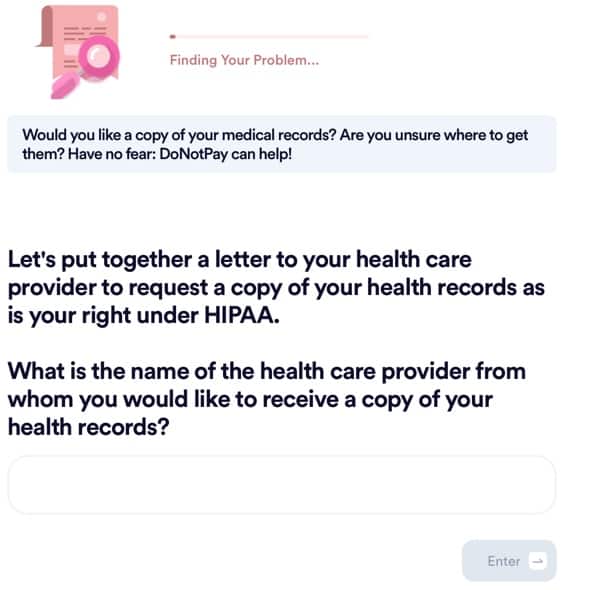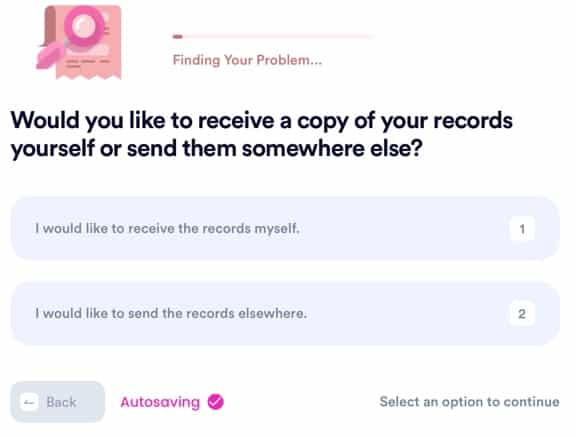How to Request UCSD Medical Records the Easy Way
Your medical records are the greatest assets when it comes to your treatment. Whether you are parting ways with your doctor, want to create emergency health plans with a loved one, or just for convenience, you have a right to request and be granted access to your medical records.
UC San Diego Health (UCSD) is no exception to this rule. Under HIPAA law, patients have a right to access their medical records. Having your records at hand helps you spot errors, continue to receive treatment, and possibly save money by avoiding duplicate treatments and procedures.
Here's a step-by-step guide showing you how to get your , how much it costs, plus how DoNotPay makes the process seamless.
How to Get Medical Records from UCSD
You can request your in two ways: online through an EMR portal or by mail and fax. Both methods will have advantages and disadvantages, but if you want to access your records faster, online is the way to go.
Requesting UCSD Medical Records Online
This method is quicker than requesting your medical records by mail. You'll need to have a MyUCSDChart account to request your medical records online. Here are the steps to follow:
- Create an account on MyUCSDChart. You'll need a social security number and an activation code from your doctor's office to set up the portal. If you don't have the activation code, you can always call 619-543-5220 anytime between 6 am and 10 pm.
- In your MyUCSDChart account, click on the menu and select medical records. Then, click on Medical Records Request, and follow the guidelines.
- Once you've followed the prompts and submitted your request, UCSD releases the records into your MyUCSDChart account within three business days. But, if your records need approval for release, it may take longer than three days.
Requesting UCSD Medical Paper Records
If you're interested in receiving your UCSD records in physical format, you can access them by mail or fax. Below is the process to follow.
- First, you'll need to print, sign, and date this Authorization for Release of Health Information form.
- Next, include a valid photo identification document. This can be a state ID, driver's license, or even a military ID. What's important is to ensure that the photo is legible. Otherwise, you risk having your medical record request denied.
- Finally, mail or fax the authorization form and identity document to the mail address or fax number below.
| Mailing Address | UC San Diego Health
Attn: Health Information Management 200 West Arbor Drive, #8825 San Diego, CA 92103 |
| Fax Number | 619-543-7128 |
Typically, it takes up to 15 days to receive your records, as long as all the requirements are met. But if UCSD experiences a delay or can't fulfill your request, they'll contact you with the directions of what to do next.
How to Transfer Medical Records From UCSD to Another Healthcare Provider
UCSD allows you to transfer medical records to another healthcare provider. You can also have the medical provider request the records on your behalf. If your healthcare provider requests for the records on your behalf, they need to either:
Mail the Authorization For Release of Medical Records, duly signed by you and dated.
Or, they can fax the written request letter on business letterhead to the fax number shared above.
The request letter should also include:
- Patient's name
- Date of birth
- Date of visit
- Information requested
- Medical record number
- Name and full address of whom the records will be released to
- Purpose of request (state whether it's for continuity of care, insurance purposes, or legal-related)
In addition, if authorization is signed by a representative (usually, authorizations are made by the patient), then the representative will need to attach a copy of one of the following documents.
- Proof of guardianship
- Designation of a personal representative
- Advance directive (where the patient is unable to make medical decisions)
Does UCSD Restrict Any Medical Records From Being Released?
Not all clinics under the UCSD hospital network allow you to request your UCSD medical records online. You'll need to contact some clinics under the network directly to get your records.
Primarily, this applies to the Rady pediatrics clinic, Shiley Eye Institute, and any occupational medicine clinics under the hospital network.
Also, UCSD will not release sensitive information such as HIV test results, psychiatric treatment records, and genetic test results without a patient's initials to acknowledge release.
What Are the Charges for UCSD Medical Records Requests?
UCSD does not charge for medical record requests made online. This means that you can access your records online at no charge.
However, if you choose to have paper records, there are charges involved. According to UCSD, the first 20 pages will be free, but the subsequent pages will be charged 25 cents each. But, if the records are sent directly to another provider, you won't be charged anything.
Requesting Medical Records Made Easier With DoNotPay
Requesting medical records on your own is often frustrating. First, you have to write the request letter, then provide all this documentation, and finally, wait for the healthcare provider to reply. It's even worse if you fail to include required documents which lead to UCSD denying your request, forcing you to start all over again.
Here's where DoNotPay comes in. With DoNotPay, you're able to quickly request your medical records without having to post mail or visit the healthcare center. DoNotPay does everything for you, including crafting the right letter that's firm in your request and within the stipulated format.
Here's how easy DoNotPay makes it to :
- Look up medical records on DoNotPay's website.

- Enter the name of the health care provider you'd like to receive medical records from.

- Answer a few questions about your provider and where you'd like to send the records.

That's it. DoNotPay will then send the letter, and you or your healthcare provider will receive the medical records in only a few weeks.
DoNotPay Works Across all Entities
It doesn't matter whether you have medical records spread across multiple healthcare providers. DoNotPay can help you retrieve them all. DoNotPay transcends states and medical facilities to get the help you need with only the click of a button.
- Kaiser medical records
- Mercy medical records
- Baptist medical records
- Cleveland clinic medical records
What Else Can You Achieve With DoNotPay?
Helping you get your UCSD medical records is only one of the ways DoNotPay can help. Other issues you can solve with DoNotPay include:
- File a complaint against any entity
- Create an advanced healthcare directive
- Request sick leave from your job
- Get access to your or your child's birth certificate
- File a case with the small claims court
- Reduce your bills
This list is not anywhere close to all that DoNotPay can do to simplify your life. Check out other top ways in which DoNotPay makes life less frustrating.


